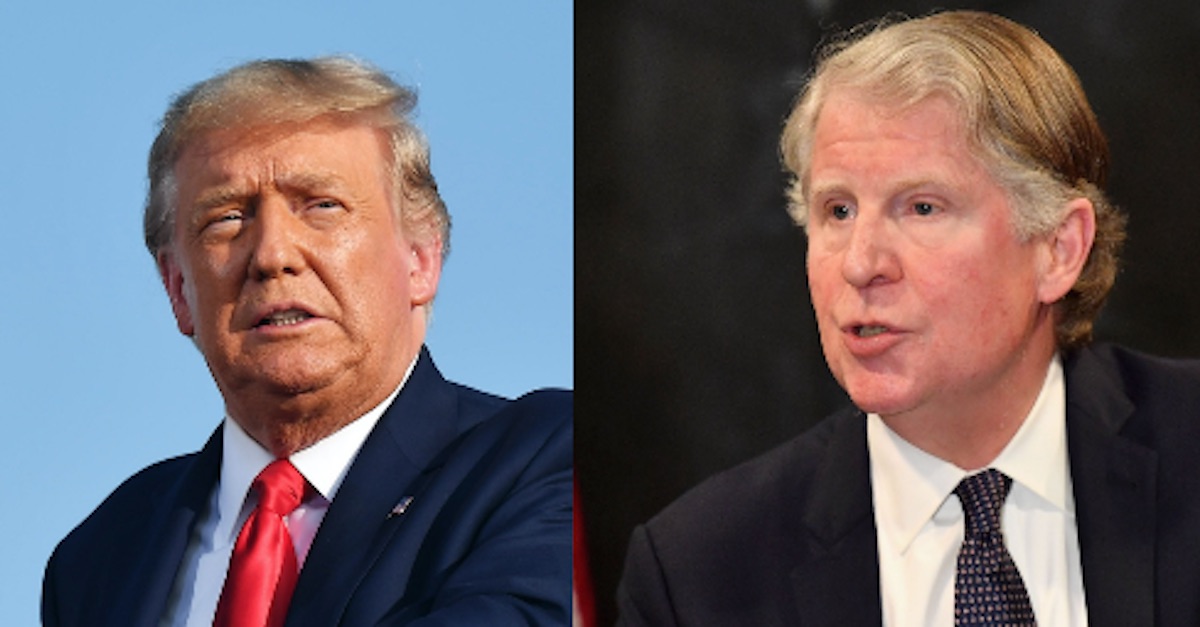
While most of the last month has centered on President Donald Trump’s legal challenges of the 2020 election, the New York Times reported Friday on Trump’s potential legal jeopardy. The Manhattan District Attorney’s Office is reportedly “significantly escalating” its criminal investigation into the president and his private business, having recently interviewed both Deutsche Bank employees and employees with insurance broker Aon.
Manhattan District Attorney Cy Vance (D) has long been trying to get his hands on President Trump’s tax returns, fighting to the Supreme Court and back and then back to the Supreme Court again. Vance previously argued in an appellate brief that he should be able to obtain the documents via a subpoena of a third party—namely, Trump’s finance firm Mazars USA LLP—because news reports indicate that a “criminal tax fraud” investigation is warranted.
The brief filed in the U.S. Court of Appeals for the Second Circuit back in September cited reports from The Washington Post, The Wall Street Journal, and The New York Times to provide a “snapshot” for the court of the Trump Organization’s “financial improprieties” that “could potentially violate New York law.” These articles addressed anything from Trump’s role in the hush money payments Michael Cohen paid out before the 2016 election to allegations that Trump has inflated his net worth to lenders and investors.
“These reports have identified transactions spanning more than a decade, involving individual and corporate actors who were based in New York County,” the brief said.
The Manhattan DA’s office mentioned that that any “misstatements” to “insurers” and “potential lenders” could “establish New York crimes,” possibly criminal tax fraud:
As discussed below, such reports place sufficient notice into the public record to render the [Second Amended Complaint’s] claims implausible. In particular, if misstatements about business properties, wherever located, were conveyed from that business’s headquarters in New York to New York-based business partners, insurers, potential lenders, or tax authorities, those misstatements could establish New York crimes such as Scheme to Defraud (Penal Law § 190.65), Falsification of Business Records (Penal Law § 175.10), Insurance Fraud (Penal Law §§ 176.15-176.30), and Criminal Tax Fraud (Tax Law §§ 1803-1806), among others.
The Times reported on Friday that the Manhattan DA’s office interviewed insurance brokerage employees and lenders:
State prosecutors in Manhattan have interviewed several employees of President Trump’s bank and insurance broker in recent weeks, according to people with knowledge of the matter, significantly escalating an investigation into the president that he is powerless to stop.
The interviews with people who work for the lender, Deutsche Bank, and the insurance brokerage, Aon, are the latest indication that once Mr. Trump leaves office, he still faces the potential threat of criminal charges that would be beyond the reach of federal pardons.
Although much attention has been paid to the subject of a possible preemptive self-pardon, President Trump’s pardon power does not extend to state crimes.
Trump has called the Vance probe a political “witch hunt” and a fishing expedition. Vance’s office argued in the appellate brief President Trump can’t merely assert generally that he’s a president under political attack to make the subpoena for his tax returns go away.
“In essence, Appellant argues (App. Br. 34-36) that he must be allowed to go forward with his speculative claims of bad faith, no matter how implausible, because he is the President. That is not the law, and that is not how Rule 12(b)(6) works,” the brief said. “To survive a motion to dismiss, he must make ‘credible, particularized allegations’ of bad faith that could plausibly overcome the presumption of validity that attaches to grand jury subpoenas.”
“Through that lens, this case is a simple one. Neither the fact that the grand jury issued the narrower Trump Organization Subpoena prior to issuing the Mazars Subpoena, nor the fact that the Mazars Subpoena mirrors a congressional subpoena, reveals or permits the Court to draw a reasonable inference that the Office acted in bad faith,” the filing went on.
The Vance subpoena stems from the DA’s ongoing grand jury investigation into the legality of hush money payments paid prior to the 2016 election, as well as aforementioned allegations of bank fraud and insurance fraud. A district court judge in New York City previously dismissed Trump’s second attempt to block enforcement of the subpoena against his personal accounting firm Mazars USA LLP, reasoning that the president did little more than reassert the “absolute immunity” argument that had already been rejected by the Supreme Court.
The Supreme Court ruled in July that the president was not absolutely immune to the state criminal process. After additional wrangling in the lower courts in the ensuing months, the president and his lawyers put the issue before the Supreme Court once again.
[Image via MANDEL NGAN/AFP via Getty Images, ANGELA WEISS/AFP via Getty Images]